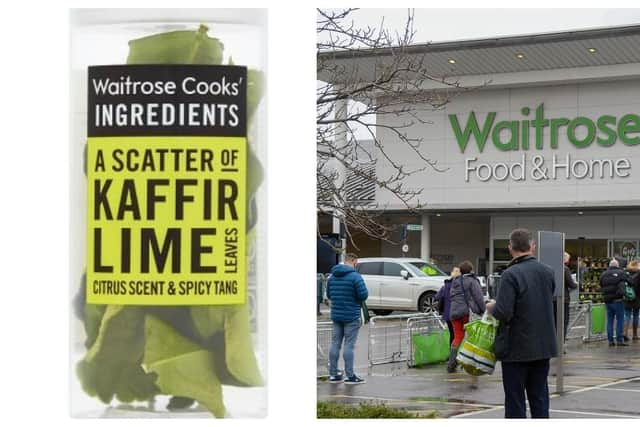What does Kaffir mean? Meaning of the racial slur - and why Waitrose is changing the name of its lime leaves
and live on Freeview channel 276
Supermarket Waitrose has announced that it will be changing the names of one of its products, after customer comments alerted the company to the racist connotations of a particular word.
This is what you need to know.
What is Waitrose doing?


Waitrose has announced that it will be changing the name of its Cooks’ Ingredients Kaffir lime leaves due to racists connotations of the word Kaffir.
Advertisement
Hide AdAdvertisement
Hide AdThe product will be rebranded as Makrut lime leaves, with Waitrose stating that “the change is being made “in response to customer comments we’ve received”.
Helena Dennis, Waitrose grocery trading manager, said: “This name change is a crucial step in recognising how important it is for us to listen to customers and educate ourselves when it comes to the language we use.
“While some of our customers may be unaware of the connotations of this particular word, it’s important to us that we avoid offending anyone who shops with us.
“It is changes like this that ensure we are moving forward.
“We need industry-wide support on this, and encourage other retailers to do the same in order to make a difference on a widespread, national scale.”
Advertisement
Hide AdAdvertisement
Hide AdThe dried lime leaves with the new packaging are set to be rolled out in all Waitrose shops, and online, by early 2022.
What does Kaffir mean?
The word Kaffir has links to a racial slur used in South Africa during apartheid.
Merriam-Webster dictionary explains: “In South Africa, the use of the term Kaffir to refer to a Black African is a profoundly offensive and inflammatory expression of contemptuous racism that is sufficient grounds for legal action.
“The term is associated with the era of apartheid when it was commonly used as an offensive racial slur, and its offensiveness has only increased over time.
Advertisement
Hide AdAdvertisement
Hide Ad“It now ranks as perhaps the most offensive term in South African English.”
In 2014, the South African Supreme Court of Appeal said in a judgement that the word is “racially abusive and offensive” and added: “In our racist past it was used to hurt, humiliate, denigrate and dehumanise Africans.
“This obnoxious word caused untold sorrow and pain to the feelings and dignity of the African people of this country.”
The term is regarded as hate speech in the region, and as recently as 2018, an estate agent was jailed for using the word over 40 times against a black police officer.
Advertisement
Hide AdAdvertisement
Hide AdWe want to hear from you: let us know what you think about this story and be part of the debate in our comments section below
Do other supermarkets stock Kaffir lime leaves?
A number of other supermarkets also stock dried lime leaves with the word Kaffir in the name of the product.
These retailers include the likes of Tesco, Morrisons and Sainsbury’s, as well as spice brands like Schwartz.
A spokesperson for Sainsbury’s said that the company is “already in the process of updating [its] product descriptions” and added that they believe “a number of other retailers are as well”.
Advertisement
Hide AdAdvertisement
Hide AdA Tesco spokesperson also said: “We stand against racism and discrimination of any kind. Along with other retailers, we have started the process of changing the name of our lime leaves.”
They explained that Tesco is working with suppliers to implement this change as soon as possible.
Comment Guidelines
National World encourages reader discussion on our stories. User feedback, insights and back-and-forth exchanges add a rich layer of context to reporting. Please review our Community Guidelines before commenting.
